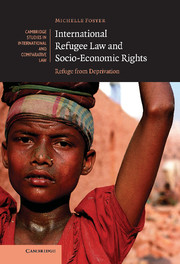Book contents
- Frontmatter
- Contents
- Acknowledgements
- Table of cases
- Table of treaties and other international instruments
- List of abbreviations
- 1 Introduction
- 2 A human rights framework for interpreting the refugee convention
- 3 Persecution and socio-economic deprivation in refugee law
- 4 Rethinking the conceptual approach to socio-economic claims
- 5 Economic deprivation as the reason for being persecuted
- 6 Economic disadvantage and the Refugee Convention grounds
- 7 Conclusions
- Bibliography
- Index
- CAMBRIDGE STUDIES IN INTERNATIONAL AND COMPARATIVE LAW
4 - Rethinking the conceptual approach to socio-economic claims
Published online by Cambridge University Press: 21 July 2009
- Frontmatter
- Contents
- Acknowledgements
- Table of cases
- Table of treaties and other international instruments
- List of abbreviations
- 1 Introduction
- 2 A human rights framework for interpreting the refugee convention
- 3 Persecution and socio-economic deprivation in refugee law
- 4 Rethinking the conceptual approach to socio-economic claims
- 5 Economic deprivation as the reason for being persecuted
- 6 Economic disadvantage and the Refugee Convention grounds
- 7 Conclusions
- Bibliography
- Index
- CAMBRIDGE STUDIES IN INTERNATIONAL AND COMPARATIVE LAW
Summary
Introduction
The analysis undertaken in Chapter 3 suggests that refugee decision-makers are currently grappling with fundamental issues regarding the status and importance of economic and social rights in international law, including the way in which such rights are implemented, and how best to measure whether a violation has occurred. In light of the difficulties highlighted in Chapter 3, it is vital that we now turn to a consideration of a more theoretical issue, namely the status of economic and social rights in international law, in order to assess the extent to which refugee decision-makers are adopting an interpretation of socio-economic rights that is consistent with developments in the field of international human rights law. The salient questions include: Is the view that economic and social rights are inherently inferior acceptable according to current understandings of the hierarchy of human rights? If there is a hierarchy of rights, is the concept of enforceability of obligation a useful or legitimate method of organizing the hierarchical model? And finally, is it meaningful to separate different kinds of rights into different categories, or are all rights interdependent and indivisible? After considering these issues in Part One of the chapter, Part Two then turns to consider the way in which the current approach to socio-economic claims should be reformulated in refugee law, in order to ensure consistency with international human rights law.
- Type
- Chapter
- Information
- International Refugee Law and Socio-Economic RightsRefuge from Deprivation, pp. 156 - 235Publisher: Cambridge University PressPrint publication year: 2007



